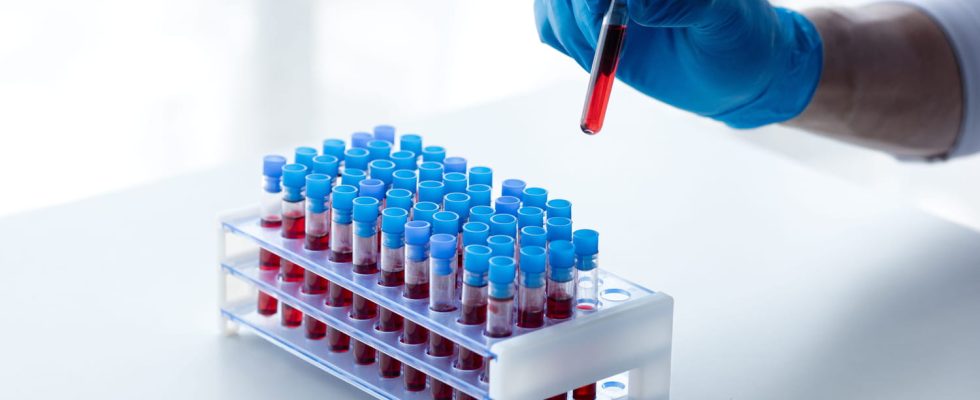Carcinoembryonic antigen (or CEA) is a protein that is measured primarily to detect colon cancer. Procedure of the dosage, standards, meaning of a high rate, causes of an increase…
The carcinoembryonic antigen (or ACE) is a protein that is normally detected in very small amounts in the blood of adults. There may be an increase in the blood level of ACE in the presence of certain types of cancer and benign conditions. The CEA assay is mainly used for Colon Cancer. Results, indications, standards.
Definition: what is the ACE marker?
Carcinoembryonic antigen (CEA) East a protein involved in cell adhesion mechanism. It is normally present in the fetus during first 6 months of pregnancy, hence its name. In adults, its presence in small quantities is normal, but an increase in its concentration in the blood can be observed in certain pathologies, whether benign (non-cancerous) or cancerous. The dosage is done by simple blood test prescribed by a doctor. It does not require fasting.
Why do an ACE test?
“In certain types of cancer and in some patients (mainly those with metastases), ACE assay may reflect cancer progression being processedexplains François-Clément Bidard, Professor of Medicine in Medical Oncology at the Institut Curie and at the University of Versailles Saint Quentin Paris Saclay. Schematically, the lower the marker, the more effective the treatment is likely to be (and vice versa). It is therefore a question ofeasy to measure and which can provide useful information on the conduct of the treatment“.
Is it a marker for colon cancer?
In other cases, especially colorectal cancer, this marker can also be used to look for a possible relapse after the treatment of a localized cancer. “The main problem with ACE (and more generally with all “serum markers”) is, on the one hand, thatthere are many cancers that do not express this marker (and whose evolution cannot therefore be monitored by ACE assay) and, on the other hand, that many pathologies having nothing to do with cancer can cause variations in this marker, which severely limits reliability“, continues the specialist.
What are the causes of a high level of ACE?
Physiological variations are observed according to sex and with age in the ACE assay. Its focus is higher in men, in the elderly and during the first two trimesters of pregnancy. The protein also increases in many pathologies:
- Colon polyps
- Crohn’s disease
- Digestive and hepatobiliary inflammatory diseases
- Pancreatitis
- Lung conditions
- Kidney failures
- Inflammatory syndromes
- Chronic alcoholism
- Cirrhosis
The results alone do not constitute a diagnosis. It is therefore important to consult a doctor in order to plan with him additional examinations or possible treatment.
What are the ACE standards?
Normal ACE values are usually less than 5 ng/mL, i.e. 5 micrograms/L in adults. However, the standards may vary according to the technique used and between laboratories. The presence of ACE in small quantities in adults is not abnormal. CEA is also found in some healthy people. We know, for example, that approximately 3% of the population has a high blood level of carcinoembryonic antigen. Smokers also show high values.
Thanks to François-Clément Bidard, Professor of Medicine in Medical Oncology at the Curie Institute and at the University of Versailles Saint Quentin Paris Saclay.
